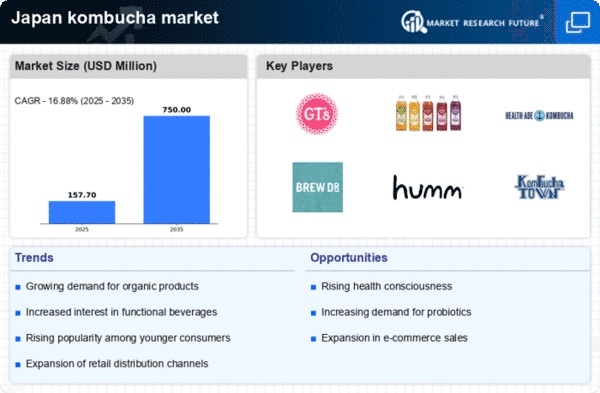Focus on Sustainability
Sustainability is becoming a pivotal driver in the kombucha market in Japan, as consumers increasingly prefer products that align with their environmental values. Brands that adopt eco-friendly practices, such as using organic ingredients and sustainable packaging, may find a competitive edge in this evolving market. Recent surveys indicate that approximately 50% of Japanese consumers are willing to pay a premium for sustainably produced beverages. This trend suggests that the kombucha market could see growth as brands emphasize their commitment to sustainability in their messaging. Additionally, the Japanese government has been promoting initiatives aimed at reducing plastic waste, which may further encourage consumers to choose sustainable options. As awareness of environmental issues continues to rise, the kombucha market is likely to benefit from this shift in consumer preferences.
Rising Health Consciousness
The kombucha market in Japan is experiencing a notable surge due to the increasing health consciousness among consumers. As individuals become more aware of the benefits of probiotics and gut health, the demand for kombucha, which is rich in these beneficial microorganisms, is likely to rise. Recent surveys indicate that approximately 60% of Japanese consumers prioritize health benefits when selecting beverages. This trend suggests that the kombucha market is well-positioned to capitalize on the growing preference for functional drinks. Furthermore, the Japanese government has been promoting healthy lifestyles, which aligns with the kombucha market's offerings. As a result, brands that emphasize health benefits in their marketing strategies may find greater success in this evolving landscape.
Innovative Marketing Strategies
The kombucha market in Japan is witnessing a shift in marketing strategies, with brands increasingly adopting innovative approaches to engage consumers. Social media platforms and influencer partnerships are becoming essential tools for reaching younger demographics, who are more likely to experiment with new beverages. Recent data indicates that around 45% of Japanese consumers aged 18-34 are influenced by social media when making beverage choices. This trend suggests that effective marketing campaigns can significantly impact the growth of the kombucha market. Additionally, experiential marketing events, such as tastings and workshops, may further enhance consumer engagement and brand loyalty. As brands continue to innovate in their marketing efforts, the kombucha market is likely to experience sustained growth.
Expansion of Distribution Channels
The kombucha market in Japan is benefiting from the expansion of distribution channels, which enhances product accessibility for consumers. Traditional retail outlets, such as supermarkets and convenience stores, are increasingly stocking kombucha products, making them more readily available to a wider audience. Recent statistics show that the availability of kombucha in retail locations has increased by approximately 30% over the past year. This expansion is crucial for the kombucha market, as it allows brands to reach consumers who may not have previously encountered these products. Furthermore, the rise of e-commerce platforms is also contributing to the growth of the kombucha market, as online shopping becomes more prevalent among Japanese consumers. This multi-channel approach is likely to drive sales and increase brand visibility.
Cultural Acceptance of Fermented Beverages
Japan has a long-standing tradition of consuming fermented products, such as miso and sake, which may facilitate the acceptance of kombucha in the market. The cultural familiarity with fermentation could lead to a smoother introduction of kombucha, as consumers are likely to be more open to trying new fermented beverages. This cultural backdrop suggests that the kombucha market could see increased penetration as brands leverage traditional fermentation narratives in their marketing. Additionally, the unique flavor profiles of kombucha may resonate with Japanese taste preferences, further enhancing its appeal. As the kombucha market continues to grow, it may benefit from this cultural alignment, potentially leading to a broader consumer base.
















